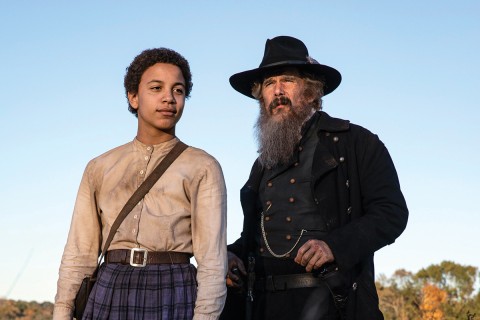The Good Lord Bird portrays abolitionist John Brown as a wild prophet
The miniseries is full of big ideas about freedom and self-determination.

The Good Lord Bird (Showtime) is a wonderful television adaptation of James McBride’s award-winning book about radical abolitionist John Brown. The story is told through the eyes of Henry “Onion” Shackleford (Joshua Caleb Johnson). Irreverent and often very funny, the seven-episode miniseries is also full of big ideas about freedom, self-determination, and sacrifice.
In the last episode, Brown (Ethan Hawke) finds his boldest plan falling apart largely because of his own erratic decisions. One of his White hostages, Colonel Lewis Washington (Brooks Ashmanskas), turns to his Black coachman, Jim (Victor Williams), who has thrown his lot in with Brown’s ill-fated insurrection. “That’s the man you think will save your people?” he asks.
Read our latest issue or browse back issues.
“He’s not going to save us,” Jim responds. “He’s trying to save you.”
This exchange encapsulates the show’s attitude toward Brown, whose legacy is worth debating in our own age of racial reckoning. On the one hand, Brown believed that the slaveholder would not relinquish the “infernal institution” without being forced to do so by violent assault and outright war. He cast this coming war in moral and religious terms, confident that God had called him to liberate the enslaved, who would rally to the cause and take up arms for their own liberation when given the chance. On the other hand, Brown rarely consulted the people he aimed to liberate, and he often made calculations that endangered more than empowered them.
The show is interested in these ordinary men and women, in how they would have encountered Brown and in their own visions of self-determination and freedom—which means this is Onion’s story, not Brown’s. As Onion travels with Brown and his ragtag group of outcasts, outlaws, and abolitionists, he isn’t sure what to make of the preacher’s radical messages. He first experiences Brown as a force of chaos in his own life: his father is killed thanks to Brown’s violent agitations, he is liberated against his own will, and he is mistaken for a girl despite his protestations.
On his journey he meets many Black characters that expand his sense of what is possible. There are famous Black leaders like Frederick Douglass (Daveed Diggs), who disappoints with his foppish habits, and Harriet Tubman (Zainab Jah), who inspires with her unswerving conviction. But most of the Black people he meets are ordinary folks whose means of resistance and self-determination are more subtle and subversive. There is Sibonia (Crystal Lee Brown), a woman who feigns insanity while secretly plotting a violent insurrection, also inspired by the message of Christian love and equality taught by a local minister. And Pie, a prostitute who is not interested in anybody’s insurrection but is plotting her own survival by any means necessary.
Onion is no stranger to the subterfuge that makes Black life possible under slavery. Going along with the fiction of being a girl is but a more extreme example of the sleights of hand enslaved people practice to appease slaveholders and survive impossible situations. White people in turn are easily duped into believing anything that confirms their view of reality. There is a running joke throughout the show that all Black people Onion meets can immediately tell that he is a boy, despite his White companions’ blindness.
This is how we first see Brown through Onion’s eyes—someone so set on his view of the world he cannot be dissuaded by sure evidence to the contrary, making him, says Onion, “the truest White man you ever met.” But over time, he comes to recognize in Brown a “special kind of crazy” that is born from resisting so fervently the very foundation of racism on which White society is built.
The Brown Onion knows is a wild prophet—white beard trembling in the wind during hour-long prayers delivered without irony—whose visions from God make him the only sane White man around. The same single-mindedness that prevents him from seeing Onion as he really is allows him to see fully the sinful perversion that is destroying the country and the souls of White people.
Onion comes to recognize in Brown a determination to live the truth in a world built on twisted lies. His own journey is a more prosaic version of the same: to be truthful to himself and to make a new life for himself far from the chaos and violence of Brown’s war. If Brown is supposed to save Onion, it would seem that he failed. But Onion, like Jim, was never waiting for a savior. He simply wants the chance to live an ordinary life beyond the lies and subterfuge of White supremacy. That Brown’s sacrifice somehow makes this more possible for Onion is, in this retelling, his great success. That we are still struggling to imagine Black life freed from this soul-crushing lie makes it a story worth telling.
A version of this article appears in the print edition under the title “A wild prophet.”







